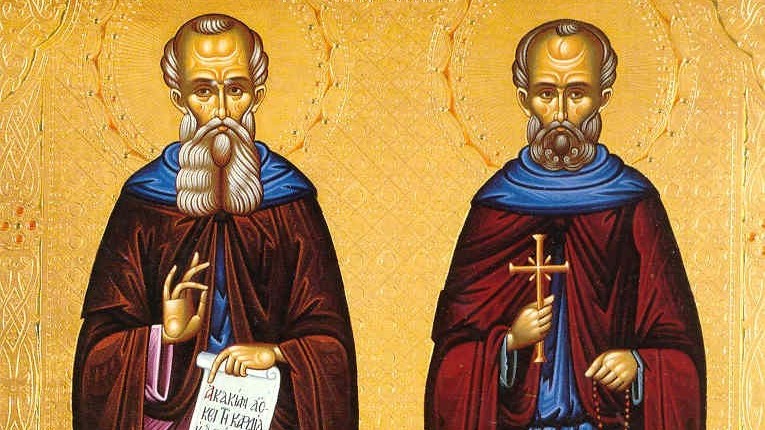TODAY’S WORD
By

Fr. Aloysius Santiago sdb
Rector and Parish Priest
Don Bosco Shrine
Lingarajapuram, Bangalore
1 John: 2:27 "As for you, the anointing that you received from Him abides in you, and so you do not need anyone to teach you. But as His anointing teaches you about all things, and is true.... abide in Him."
REFLECTION
 Gospel of the Day presents to us the message of not slipping into negligence or casualness….… Rather, seeks to keep up our spirits high, and to be on the vigilance always.
Gospel of the Day presents to us the message of not slipping into negligence or casualness….… Rather, seeks to keep up our spirits high, and to be on the vigilance always.
People with great enthusiasm always tend to brush the energy onto others. People with a passionate zeal always make a positive impact on the other. People with a fighting spirit always rub on the vigour into other people. And such a person… is John the Baptist.
The Fourth Gospel introduces the person of St John the Baptist to us. He is a person of great enthusiasm, of a passionate zeal and of a fighting spirit. Some Priests and Levites came to him to ask, “Who are you” (Jn 1: 19). John the Baptist was quite clear and convinced of the answer to this question.
He admitted that he was not the Messiah. (Jn 1: 20)
He admitted that he was not Elijah. (Jn 1: 21)
He admitted that he was not the Prophet. (Jn 1: 21)
He testified that he was the voice crying in the desert. (Jn 1: 23)
He testified that he was the one exhorting to ‘make straight the way of the Lord’. (Jn 1:23)
He testified that he was the witness to the Light that was coming to enlighten the world. (Jn1: 8)
He testified that the One coming after him was ranking ahead of him (Jn 1: 15)
A deep conviction of “who he was” guided all the actions of John the Baptist.
A powerful knowledge of “his role in life” was the strength of mission for John the Baptist.
A clear cut awareness of “what was his mission” was the secret of success for John the Baptist.
QUESTIONS TO PONDER
Do I possess such kind of a deep and “anchored” conviction in my Christian Life? John the Baptist was questioned, “Who are you” by many people. He had an answer for it…… and that made Him not to waver or get bogged down by situations. Life often throws this question to us – “Who are you?” When we face emotional crisis in our relationships and social interactions, we are encountered with this question, deep within us…… “Who are you?” When things in life do not go the way we wished or expected and somehow the future appears bleak, we are encountered with this question, deep within us…… “Who are you?” When in the castle of interiority, we experience barrenness and a feeling of isolation from the Lord, we are encountered with this question, deep within us …… “Who are you?”
Failing to find an answer to this question can sometimes….… plunge us into a deep struggle… make us to fear life and people…. crush our hopes and aspirations. We may tend to think…… “What really is the purpose of my life?? … “Why should I continue to life in this manner?”… “I wish I could just be free from all this web of pain and tensions!” Yes, life will at many times, throw this question at us – “Who are you?”
Today, St John the Baptist, exhorts & challenges us, to not get too disturbed when we are faced with this provoking question in life. Our faith and strength, like St John the Baptist, ought to be Jesus, the Light. Our hope and courage, like St John the Baptist, ought to be Jesus, the Messiah. I am God’s Child…. in this is my true identity. I am the witness to the True Light…… in this is my true role in life. I am a Voice in the wilderness…… in this is my Christian duty and obligation. I am dependant on the Grace and Mercy of the Lord…… in this is my authentic hope and faith. May St John the Baptist, whom we have come to “know more” today, become an inspiration and a challenge, as we march forward…… with faith and love… through the valleys and mountains… and wilderness and oasis
SAINTS OF THE DAY
 SAINT BASIL THE GREAT AND GREGORY NAZIANZEN: BISHOPS AND DOCTORS OF THE CHURCH
SAINT BASIL THE GREAT AND GREGORY NAZIANZEN: BISHOPS AND DOCTORS OF THE CHURCH
The story and history of SAINT BASIL the GREAT. Basil was born in Asia Minor. Two of his brothers became bishops, and, together with his mother and sister, are honored as Saints. He studied with great success at Athens, where he formed with Saint Gregory Nazianzen the tenderest friendship. He then taught oratory; but dreading the honors of the world, he gave up all, and became the father of the monastic life in the East. The Arian heretics, supported by the court, were then persecuting the Church; and Basil was summoned from his retirement by his bishop to give aid against them.
His energy and zeal soon mitigated the disorders of the Church, and his solid and eloquent words silenced the heretics. On the death of Eusebius, he was chosen Bishop of Caesarea. His commanding character, his firmness and energy, his learning and eloquence, and not less his humility and the exceeding austerity of his life, made him a model for bishops. When Basil was required to admit the Arians to Communion, the prefect, finding that soft words had no effect, said to him, “Are you mad, that you resist the will before which the whole world bows? Do you not dread the wrath of the emperor, nor exile, nor death?” “No,” said Basil calmly; “he who has nothing to lose need not dread loss of goods; you cannot exile me, for the whole earth is my home; as for death, it would be the greatest kindness you could bestow upon me; torments cannot harm me: one blow would end my frail life and my sufferings together.” “Never,” said the prefect, “has any one dared to address me thus.” “Perhaps,” suggested Basil, “you never before measured your strength with a Christian bishop.” The emperor desisted from his commands. Basil’s whole life was one of suffering. He lived amid jealousies and misunderstandings and seeming disappointments. But he sowed the seed which bore goodly fruit in the next generation, and was God’s instrument in beating back the Arian and other heretics in the East, and restoring the spirit of discipline and fervor in the Church. He died in 379, and is venerated as a Doctor of the Church.
